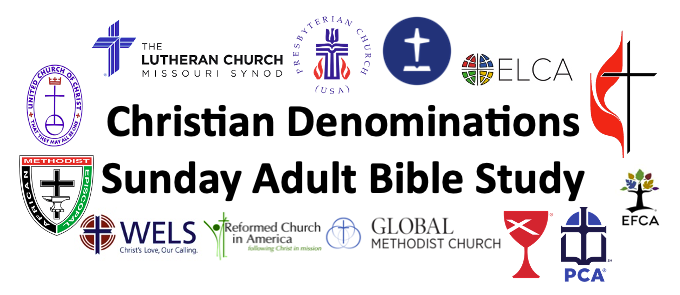Adult Bible Studies
Current Adult Bible Studies
Sunday Adult Bible Study: 1 Corinthians
In many ways, the Church of Corinth is much like the Western Christian Church today. Corinth was a major Greek seaport complete with traffic, travelers, sailors, and merchants. Corinth was cosmopolitan, pagan, idolatrous and immoral. At its height, Corinth was the fourth-largest city in the Roman Empire. Among its inhabitants were Roman colonists, ex-slaves, former soldiers, admirers of Greek wisdom and culture, and a scattering of Jews. It was a very prosperous and wealthy city, but it was also a very irreligious city.
Naturally, when the Christian faith collided with the paganism in Corinth, the young congregation founded by St. Paul, was plagued with many problems and questions. These problems included congregational factions, lawsuits, promiscuity, marriage and divorce, desertion, the place of women in the church, the Sacrament of the Altar, and the resurrection of the body. The Church in Corinth turned to St. Paul for guidance and counsel.
The Church in Corinth was not a perfect congregation, but through the Holy Spirit, St. Paul told this imperfect congregation about God’s grace. The experiences of the Church in Corinth are increasingly those of present-day Christians, not only in traditional heathen countries, but also in so-called Christian lands slipping deeper into pagan ways. The impact of the fallen world’s morality on the Church is all so evident today, with political factions growing, marriages failing, sexual morality sinking, and church disorders increasing. Today’s Christian faces many of the moral dilemmas reflected in this epistle.
At the same time, 1 Corinthians is a letter of hope for our times. In trying to hold the Corinthians to the Word of God, St. Paul found it necessary to state both their human faults and their proper goals. In the epistle, St. Paul shows them the way of error and the way of truth. This epistle is practical as it presents everyday problems confronting Christians in the world as the Holy Spirit supplies the answers to our daily problems.
This study will begin upon the completion of our Ten Commandments study from Luther’s Large Catechism. We will return to Luther’s Large Catechism in the winter as we study the Creed. Upon completion of the 1 Corinthians study, we will study the vocation of a Christian voter in the fall.
Weekly Studies on 1 Corinthians
Naturally, when the Christian faith collided with the paganism in Corinth, the young congregation founded by St. Paul, was plagued with many problems and questions. These problems included congregational factions, lawsuits, promiscuity, marriage and divorce, desertion, the place of women in the church, the Sacrament of the Altar, and the resurrection of the body. The Church in Corinth turned to St. Paul for guidance and counsel.
The Church in Corinth was not a perfect congregation, but through the Holy Spirit, St. Paul told this imperfect congregation about God’s grace. The experiences of the Church in Corinth are increasingly those of present-day Christians, not only in traditional heathen countries, but also in so-called Christian lands slipping deeper into pagan ways. The impact of the fallen world’s morality on the Church is all so evident today, with political factions growing, marriages failing, sexual morality sinking, and church disorders increasing. Today’s Christian faces many of the moral dilemmas reflected in this epistle.
At the same time, 1 Corinthians is a letter of hope for our times. In trying to hold the Corinthians to the Word of God, St. Paul found it necessary to state both their human faults and their proper goals. In the epistle, St. Paul shows them the way of error and the way of truth. This epistle is practical as it presents everyday problems confronting Christians in the world as the Holy Spirit supplies the answers to our daily problems.
This study will begin upon the completion of our Ten Commandments study from Luther’s Large Catechism. We will return to Luther’s Large Catechism in the winter as we study the Creed. Upon completion of the 1 Corinthians study, we will study the vocation of a Christian voter in the fall.
Weekly Studies on 1 Corinthians
- Introduction to 1 Corinthians
- 1 Corinthians, Chapter 1
- 1 Corinthians, Chapter 2
- 1 Corinthians, Chapter 3
- 1 Corinthians, Chapter 4
- 1 Corinthians, Chapter 5 (Sunday, July 14)

Wednesday Morning Bible Study - 1 Peter
The people who received Peter’s Letters often faced persecution for their faith. They could not worship the community false idols or the national gods. They had to refuse participation in the local feasts and parties, often dedicated to one of the many gods or goddesses in the region. They couldn’t even perform the patriotic act of burning incense to Caesar because it was a form of prayer. Idolatry was woven into the daily life of the individual and the community. As a result, their friends and neighbors turned against them. Persecution became a daily fact of life for people who trusted Jesus for their salvation. Was their faith in Jesus Christ worth the suffering, persecution, and isolation they had to endure?
Amazingly, St. Peter tells them that persecution actually benefits God’s people. Perhaps we can illustrate this benefit by turning to human relationships. Difficult times often make or break relationships. Tragedy, terrible personal crises, and loss force us to come together and become stronger. Many of us have stories of critical times when our life and trust in someone was put to the test. These critical times forge the bonds of our relationships. Those that survive the test are stronger than before.
Please join your fellow brothers and sisters in Christ each Wednesday at 9:30 a.m. beginning on July 3!
The people who received Peter’s Letters often faced persecution for their faith. They could not worship the community false idols or the national gods. They had to refuse participation in the local feasts and parties, often dedicated to one of the many gods or goddesses in the region. They couldn’t even perform the patriotic act of burning incense to Caesar because it was a form of prayer. Idolatry was woven into the daily life of the individual and the community. As a result, their friends and neighbors turned against them. Persecution became a daily fact of life for people who trusted Jesus for their salvation. Was their faith in Jesus Christ worth the suffering, persecution, and isolation they had to endure?
Amazingly, St. Peter tells them that persecution actually benefits God’s people. Perhaps we can illustrate this benefit by turning to human relationships. Difficult times often make or break relationships. Tragedy, terrible personal crises, and loss force us to come together and become stronger. Many of us have stories of critical times when our life and trust in someone was put to the test. These critical times forge the bonds of our relationships. Those that survive the test are stronger than before.
Please join your fellow brothers and sisters in Christ each Wednesday at 9:30 a.m. beginning on July 3!
Past Sunday Adult Bible Studies
Back to the Basics:
|
Christian DenominationsThe Fall 2023 and Winter 2024 Sunday Adult Bible Study is studying the similarities and differences of church bodies within each Christian denomination from a Lutheran perspective.
God in the JukeboxThis Summer 2023 Sunday Adult Bible Study studied how Christian doctrine rightly and wrongly portrayed in popular music and how we are catechized by what we watch and listen to daily.
|






